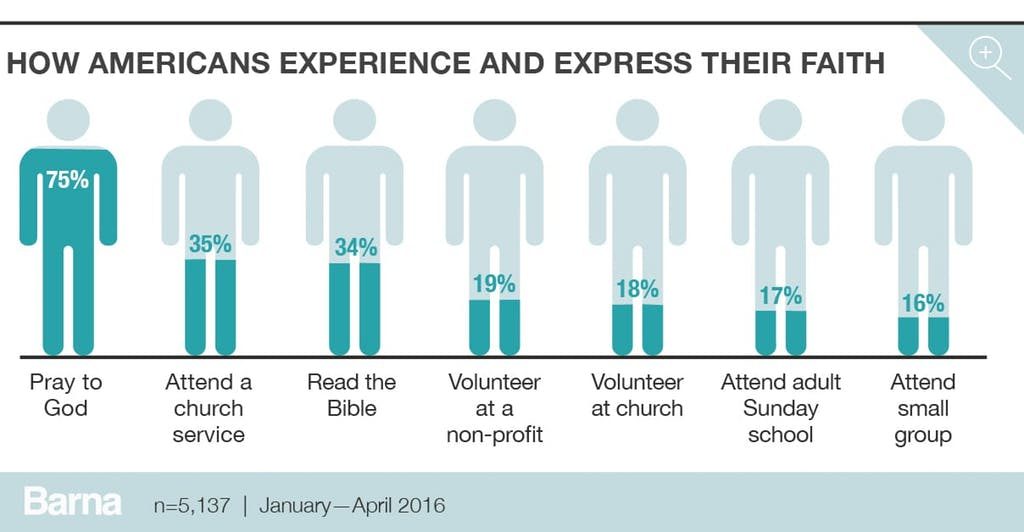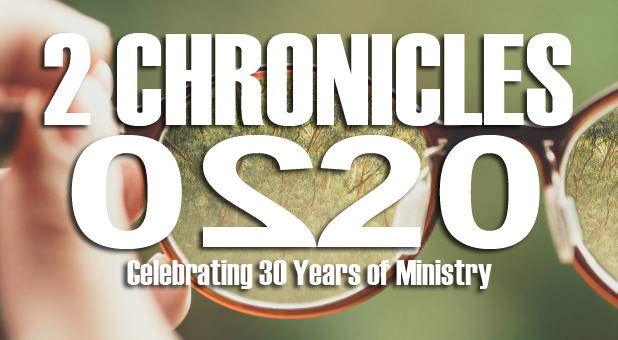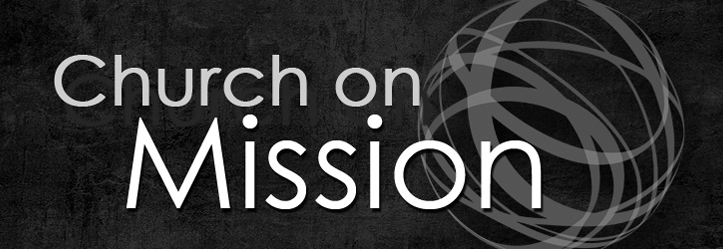Let’s jump in!
MLK: I Have a Dream
I am happy to join with you today in what will go down in history as the greatest demonstration for freedom in the history of our nation.
Five score years ago, a great American, in whose symbolic shadow we stand today, signed the Emancipation Proclamation. This momentous decree came as a great beacon light of hope to millions of Negro slaves who had been seared in the flames of withering injustice. It came as a joyous daybreak to end the long night of their captivity.
But one hundred years later, the Negro still is not free. One hundred years later, the life of the Negro is still sadly crippled by the manacles of segregation and the chains of discrimination. One hundred years later, the Negro lives on a lonely island of poverty in the midst of a vast ocean of material prosperity. One hundred years later, the Negro is still languished in the corners of American society and finds himself an exile in his own land. And so we’ve come here today to dramatize a shameful condition.
In a sense we’ve come to our nation’s capital to cash a check. When the architects of our republic wrote the magnificent words of the Constitution and the Declaration of Independence, they were signing a promissory note to which every American was to fall heir. This note was a promise that all men, yes, black men as well as white men, would be guaranteed the “unalienable Rights” of “Life, Liberty and the pursuit of Happiness.” It is obvious today that America has defaulted on this promissory note, insofar as her citizens of color are concerned. Instead of honoring this sacred obligation, America has given the Negro people a bad check, a check which has come back marked “insufficient funds.”
But we refuse to believe that the bank of justice is bankrupt. We refuse to believe that there are insufficient funds in the great vaults of opportunity of this nation. And so, we’ve come to cash this check, a check that will give us upon demand the riches of freedom and the security of justice.
We have also come to this hallowed spot to remind America of the fierce urgency of Now. This is no time to engage in the luxury of cooling off or to take the tranquilizing drug of gradualism. Now is the time to make real the promises of democracy. Now is the time to rise from the dark and desolate valley of segregation to the sunlit path of racial justice. Now is the time to lift our nation from the quicksands of racial injustice to the solid rock of brotherhood. Now is the time to make justice a reality for all of God’s children.
It would be fatal for the nation to overlook the urgency of the moment. This sweltering summer of the Negro’s legitimate discontent will not pass until there is an invigorating autumn of freedom and equality. Nineteen sixty-three is not an end, but a beginning. And those who hope that the Negro needed to blow off steam and will now be content will have a rude awakening if the nation returns to business as usual. And there will be neither rest nor tranquility in America until the Negro is granted his citizenship rights. The whirlwinds of revolt will continue to shake the foundations of our nation until the bright day of justice emerges.
But there is something that I must say to my people, who stand on the warm threshold which leads into the palace of justice: In the process of gaining our rightful place, we must not be guilty of wrongful deeds. Let us not seek to satisfy our thirst for freedom by drinking from the cup of bitterness and hatred. We must forever conduct our struggle on the high plane of dignity and discipline. We must not allow our creative protest to degenerate into physical violence. Again and again, we must rise to the majestic heights of meeting physical force with soul force.
The marvelous new militancy which has engulfed the Negro community must not lead us to a distrust of all white people, for many of our white brothers, as evidenced by their presence here today, have come to realize that their destiny is tied up with our destiny. And they have come to realize that their freedom is inextricably bound to our freedom.
We cannot walk alone.
And as we walk, we must make the pledge that we shall always march ahead.
We cannot turn back.
There are those who are asking the devotees of civil rights, “When will you be satisfied?” We can never be satisfied as long as the Negro is the victim of the unspeakable horrors of police brutality. We can never be satisfied as long as our bodies, heavy with the fatigue of travel, cannot gain lodging in the motels of the highways and the hotels of the cities. We cannot be satisfied as long as the negro’s basic mobility is from a smaller ghetto to a larger one. We can never be satisfied as long as our children are stripped of their self-hood and robbed of their dignity by signs stating: “For Whites Only.” We cannot be satisfied as long as a Negro in Mississippi cannot vote and a Negro in New York believes he has nothing for which to vote. No, no, we are not satisfied, and we will not be satisfied until “justice rolls down like waters, and righteousness like a mighty stream.”¹
I am not unmindful that some of you have come here out of great trials and tribulations. Some of you have come fresh from narrow jail cells. And some of you have come from areas where your quest — quest for freedom left you battered by the storms of persecution and staggered by the winds of police brutality. You have been the veterans of creative suffering. Continue to work with the faith that unearned suffering is redemptive. Go back to Mississippi, go back to Alabama, go back to South Carolina, go back to Georgia, go back to Louisiana, go back to the slums and ghettos of our northern cities, knowing that somehow this situation can and will be changed.
Let us not wallow in the valley of despair, I say to you today, my friends.
And so even though we face the difficulties of today and tomorrow, I still have a dream. It is a dream deeply rooted in the American dream.
I have a dream that one day this nation will rise up and live out the true meaning of its creed: “We hold these truths to be self-evident, that all men are created equal.”
I have a dream that one day on the red hills of Georgia, the sons of former slaves and the sons of former slave owners will be able to sit down together at the table of brotherhood.
I have a dream that one day even the state of Mississippi, a state sweltering with the heat of injustice, sweltering with the heat of oppression, will be transformed into an oasis of freedom and justice.
I have a dream that my four little children will one day live in a nation where they will not be judged by the color of their skin but by the content of their character.
I have a dream today!
I have a dream that one day, down in Alabama, with its vicious racists, with its governor having his lips dripping with the words of “interposition” and “nullification” — one day right there in Alabama little black boys and black girls will be able to join hands with little white boys and white girls as sisters and brothers.
I have a dream today!
I have a dream that one day every valley shall be exalted, and every hill and mountain shall be made low, the rough places will be made plain, and the crooked places will be made straight; “and the glory of the Lord shall be revealed and all flesh shall see it together.”
This is our hope, and this is the faith that I go back to the South with.
With this faith, we will be able to hew out of the mountain of despair a stone of hope. With this faith, we will be able to transform the jangling discords of our nation into a beautiful symphony of brotherhood. With this faith, we will be able to work together, to pray together, to struggle together, to go to jail together, to stand up for freedom together, knowing that we will be free one day.
And this will be the day — this will be the day when all of God’s children will be able to sing with new meaning:
My country ’tis of thee, sweet land of liberty, of thee I sing.
Land where my fathers died, land of the Pilgrim’s pride,
From every mountainside, let freedom ring!
And if America is to be a great nation, this must become true.
And so let freedom ring from the prodigious hilltops of New Hampshire.
Let freedom ring from the mighty mountains of New York.
Let freedom ring from the heightening Alleghenies of Pennsylvania.
Let freedom ring from the snow-capped Rockies of Colorado.
Let freedom ring from the curvaceous slopes of California.
But not only that:
Let freedom ring from Stone Mountain of Georgia.
Let freedom ring from Lookout Mountain of Tennessee.
Let freedom ring from every hill and molehill of Mississippi.
From every mountainside, let freedom ring.
And when this happens, when we allow freedom ring, when we let it ring from every village and every hamlet, from every state and every city, we will be able to speed up that day when all of God’s children, black men and white men, Jews and Gentiles, Protestants and Catholics, will be able to join hands and sing in the words of the old Negro spiritual:
Free at last! Free at last!
Thank God Almighty, we are free at last!
HOW Americans experience FAITH in 2020?
4 Ways to Improve Your Church in 2020
Barna Group: The State of the Church in 2020
You are reading a free research sample of State of the Church & Family Report
The Christian church has been a cornerstone of American life for centuries, but much has changed in the last 30 years. Americans are attending church less, and more people are experiencing and practicing their faith outside of its four walls. Millennials in particular are coming of age at a time of great skepticism and cynicism toward institutions—particularly the church. Add to this the broader secularizing trend in American culture, and a growing antagonism toward faith claims, and these are uncertain times for the U.S. church. Based on a large pool of data collected over the course of this year, Barna conducted an analysis on the state of the church, looking closely at affiliation, attendance and practice to determine the overall health of Christ’s Body in America.
Most Americans Identify as Christian
Debates continue to rage over whether the United States is a “Christian” nation. Some believe the Constitution gives special treatment or preference to Christianity, but others make their claims based on sheer numbers—and they have a point: Most people in this country identify as Christian. Almost three-quarters of Americans (73%) say they are a Christian, while only one-fifth (20%) claim no faith at all (that includes atheists and agnostics). A fraction (6%) identify with faiths like Islam, Buddhism, Judaism or Hinduism, and 1 percent are unsure. Not only do most Americans identify as Christian, but a similar percentage (73%) also agree that religious faith is very important in their life (52% strongly agree + 21% somewhat agree).
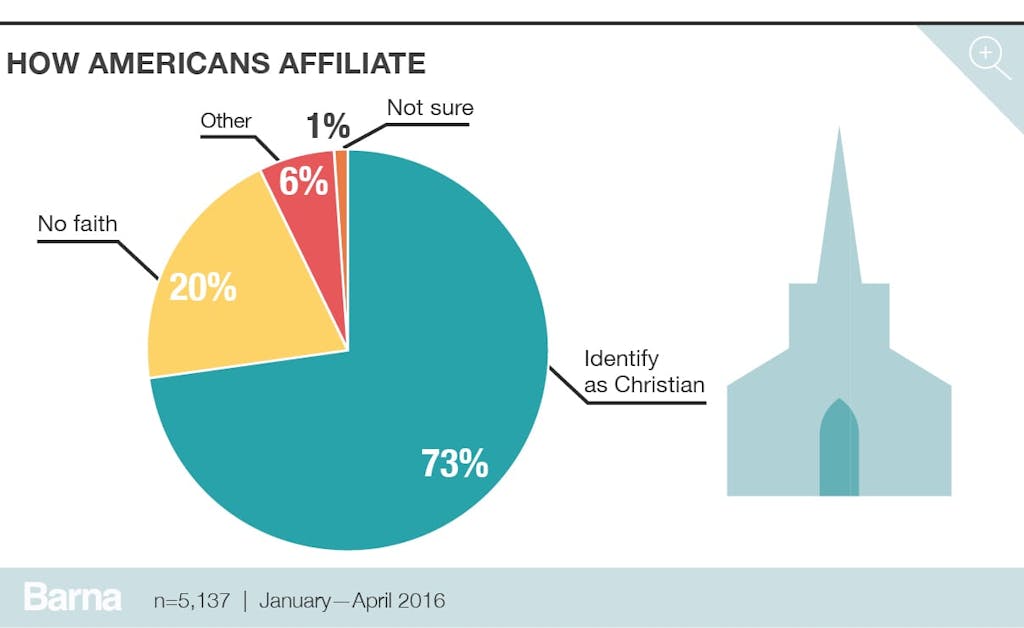
Attending Church Is a Good Indicator of Faith Practice
Even though a majority of Americans identify as Christian and say religious faith is very important in their life, these huge proportions belie the much smaller number of Americans who regularly practicetheir faith. When a variable like church attendance is added to the mix, a majority becomes the minority. When a self-identified Christian attends a religious service at least once a month and says their faith is very important in their life, Barna considers that person a “practicing Christian.” After applying this triangulation of affiliation, self-identification and practice, the numbers drop to around one in three U.S. adults (31%) who fall under this classification. Barna researchers argue this represents a more accurate picture of Christian faith in America, one that reflects the reality of a secularizing nation.
Another way Barna measures religious decline is through the “post-Christian” metric. If an individual meets 60 percent or more of a set of factors, which includes things like disbelief in God or identifying as atheist or agnostic, and they do not participate in practices such as Bible reading, prayer and church attendance (full description below), they are considered post-Christian. Based on this metric, almost half of all American adults (48%) are post-Christian.
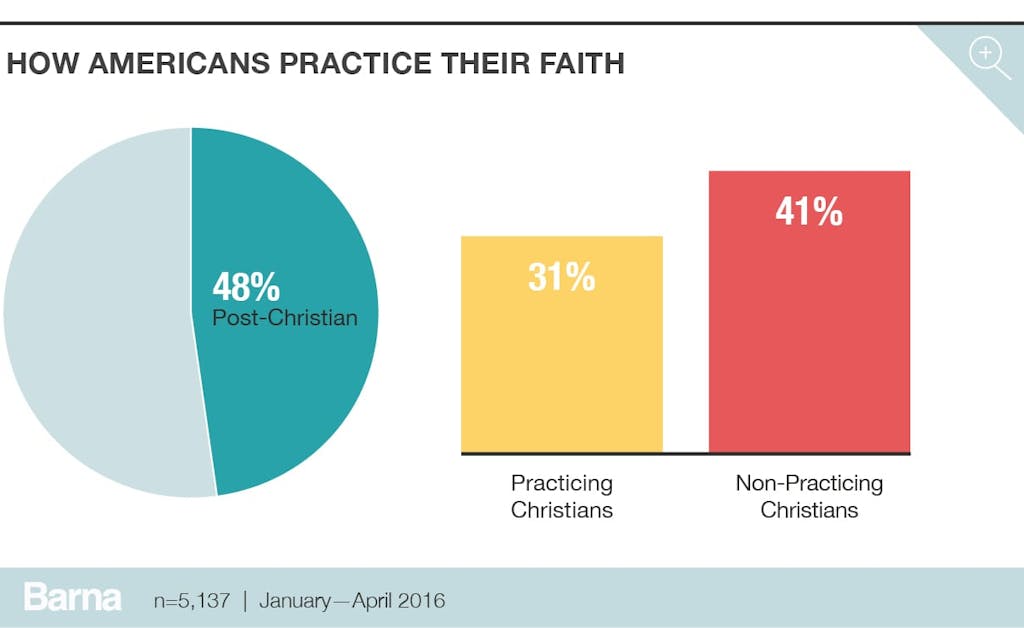
Most Americans Attend Small to Medium Churches
As far as Barna is concerned, regular church attendance is central to understanding faith practice among American adults. Whether their church is large or small, charismatic or traditional, significant numbers of Americans sit in the pews each Sunday to worship together. Despite the enormous cultural impact of megachurches and megachurch pastors like Joel Osteen and his 40,000+ Lakewood Church, the largest group of American churchgoers attends services in a more intimate context. Almost half (46%) attend a church of 100 or fewer members. More than one-third (37%) attend a midsize church of over 100, but not larger than 499. One in 11 (9%) attends a church with between 500 and 999 attenders, and slightly fewer (8%) attend a very large church of 1,000 or more attendees.

There Are More Churched Than Unchurched Americans
Digging deeper into church attendance, Barna uses another metric to distinguish between two main groups: those who are “churched” versus those who are “unchurched.” Churched adults are active churchgoers who have attended a church service—with varying frequency—within the past six months (not including a special event such as a wedding or a funeral). Unchurched adults, on the other hand, have not attended a service in the past six months. (They may be dechurched, meaning they once attended regularly, or purely unchurched, meaning they have never been involved in a Christian faith community.) Under these definitions, a slight majority of adults (55%) are churched—though the country is almost evenly split, with 45 percent qualifying as unchurched adults.
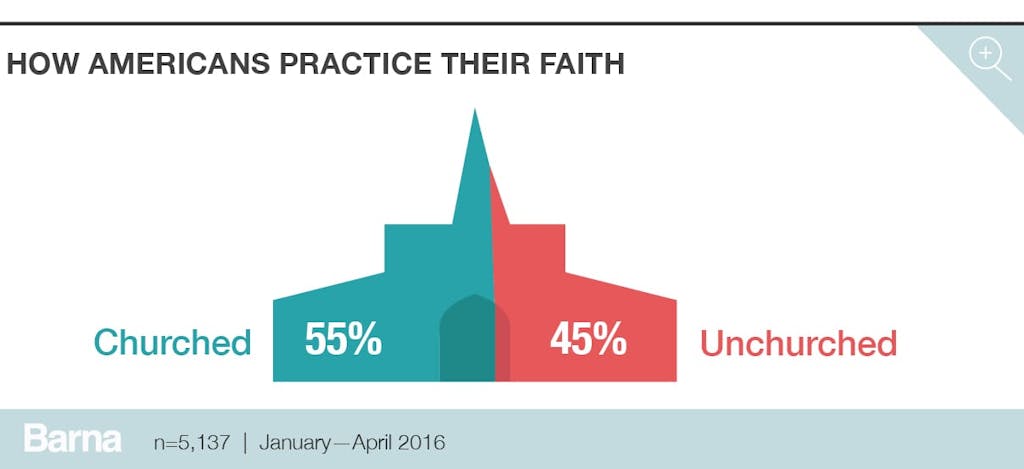
Christians Are More Generous Than Their Secular Peers
In Matthew 6, Jesus lays out three essential components of discipleship: prayer, fasting and almsgiving. The latter of the three, which we might also call justice and personal charity, is one of the pillars of a healthy spiritual life. Though residents in some cities are more generous than others, Americans give to churches more than any nonprofit organization. More than half of Americans (54%) have given money to a church in the past year—half that number have given to a nonprofit other than a church (22%). The remaining one-quarter (24%) have given to neither. Unsurprisingly almost all practicing Christians (94%) have given to a church, compared to one-quarter (23%) of atheists or agnostics. In fact, practicing Christians tend to be more generous overall than their secular counterparts: 96 percent of practicing Christians gave to a church or a nonprofit, compared to 60 percent among atheists and agnostics.
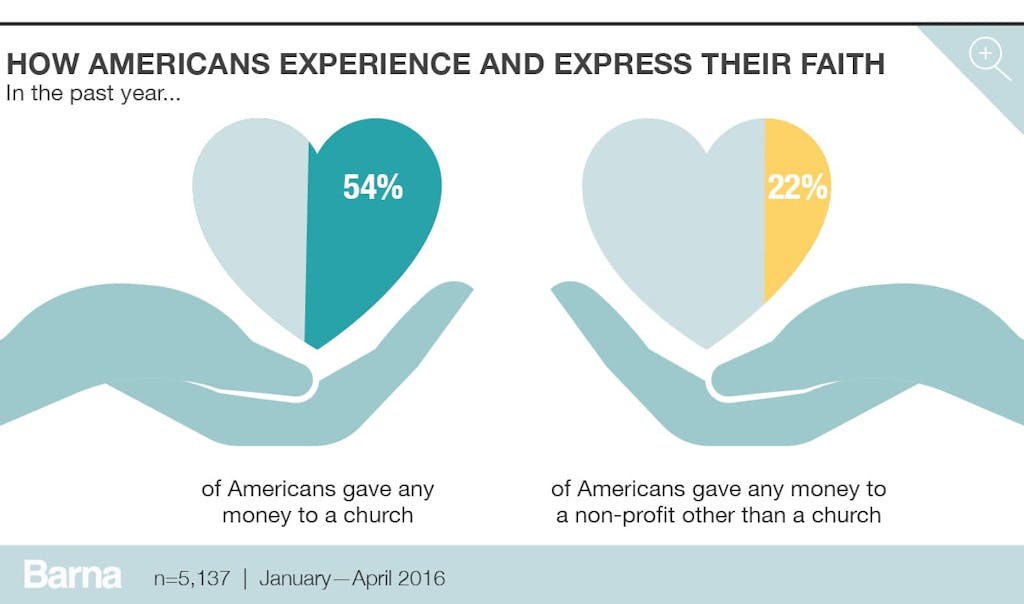
Americans Express Their Faith in a Variety of Ways
While regular church attendance is a reliable indicator of faithful Christian practice, many Americans choose to experience and express their faith in a variety of other ways, the most common of which is prayer. For instance, three-quarters of Americans (75%) claim to have prayed to God in the last week. This maps fairly well onto the 73 percent who self-identify as Christian. Following prayer, the next most common activity related to faith practice is attending a church service, with more than one-third of adults (35%) having sat in a pew in the last seven days, not including a special event such as a wedding or funeral. About the same proportion (34%) claim to have read the Bible on their own, not including when they were at a church or synagogue. About one in six American adults have either volunteered at a nonprofit (19%) or at church (18%) in the last week. Slightly fewer attended Sunday school (17%) or a small group (16%).
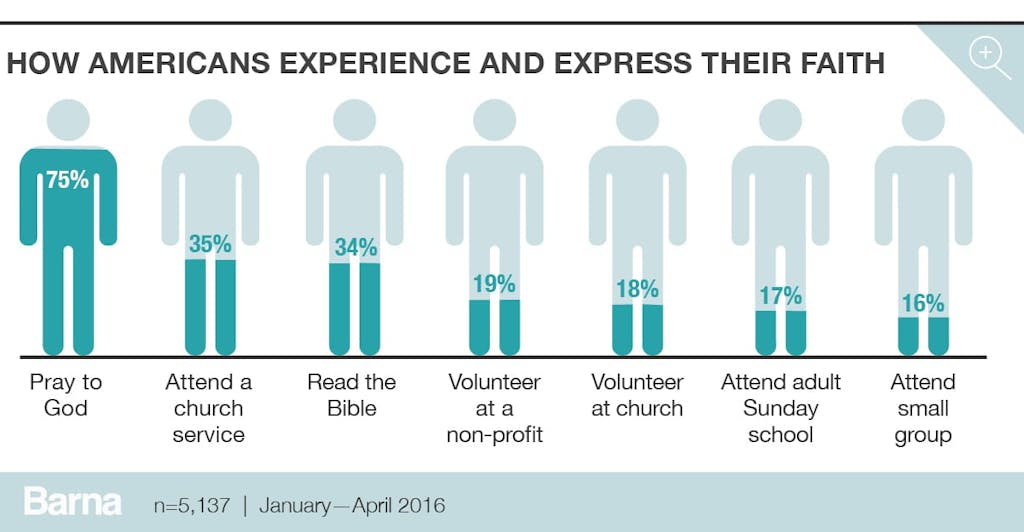
Evangelicals Are a Small but Influential Group
Classifications and metrics are vital to understanding the religious makeup of the United States. Barna uses several of these to identify key faith groups in America, including “born again Christians,” “evangelical Christians” and those who are “Bible-minded.” The largest of these groups are born again Christians, which make up roughly one-third of the population (35%). These individuals have made a personal commitment to Jesus Christ that is still important in their life today and believe that, when they die, they will go to heaven because they have confessed their sins and accepted Jesus Christ as their savior. The next largest group are those considered Bible-minded, who make up about one-quarter of the population (23%). They believe the Bible is accurate in all the principles it teaches and have read the Scriptures within the past week. Finally, the small (7%) but influential group of evangelicals are those who meet the born again criteria plus seven other conditions (detailed below), which are made up of a set of doctrinal views that touch on topics like evangelism, Satan, biblical inerrancy and salvation.
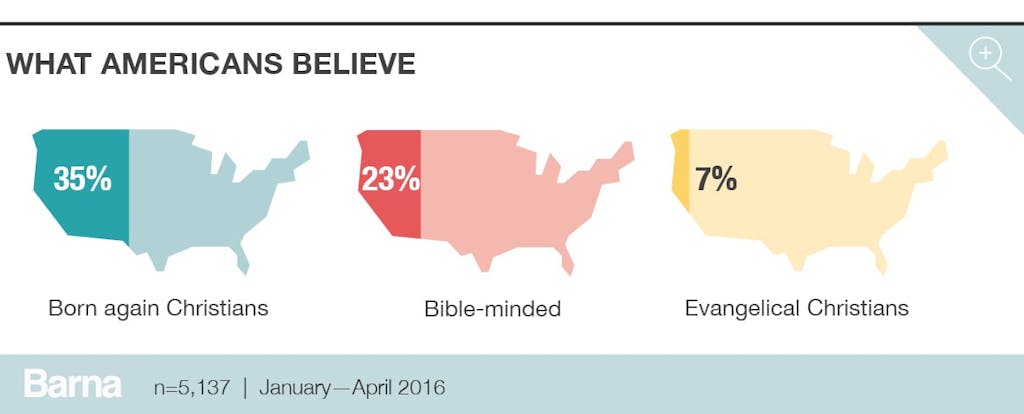
Americans Hold Both Orthodox and Heterodox Views
Religion and politics: two topics best excluded from polite conversation. This old adage appears to have the support of most Americans. When asked whether they, personally, have a responsibility to tell other people their religious beliefs, most people (54%) disagree (46% believe otherwise, very close to an even split). Getting at orthodoxy (or, rather, heterodoxy) among the American population, most (55%) agree that if a person is generally good, or does good enough things for others during their life, they will earn a place in heaven.
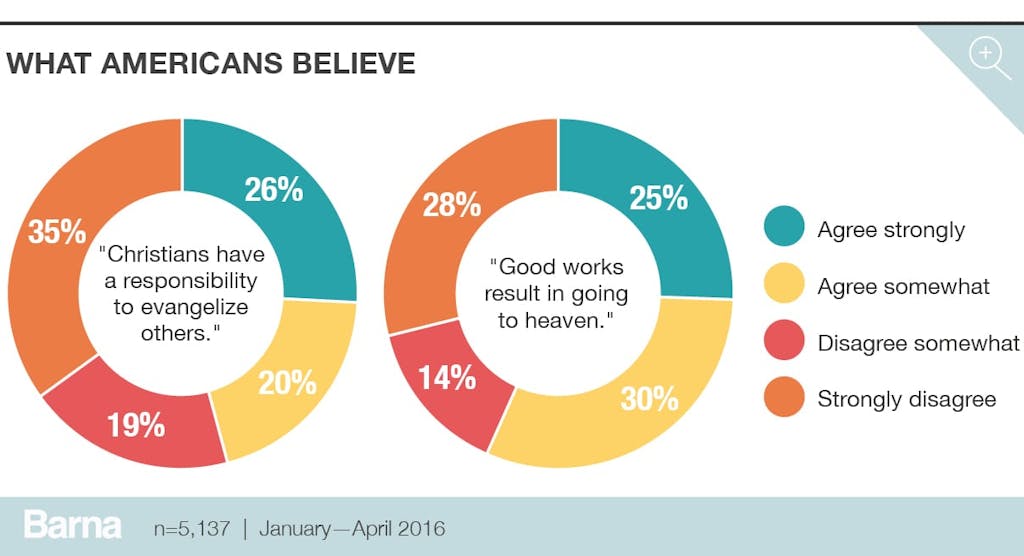
Yet in spite of the popularity of the belief that good works is sufficient for eternal life, from a long list of options for ways to describe God, the majority (57%) choose the most orthodox view: that God is the all-powerful, all-knowing, perfect creator of the universe who rules the world today. Other views of God make up one-third (33%) of the responses, and one in 10 (10%) says there is no such thing as God.
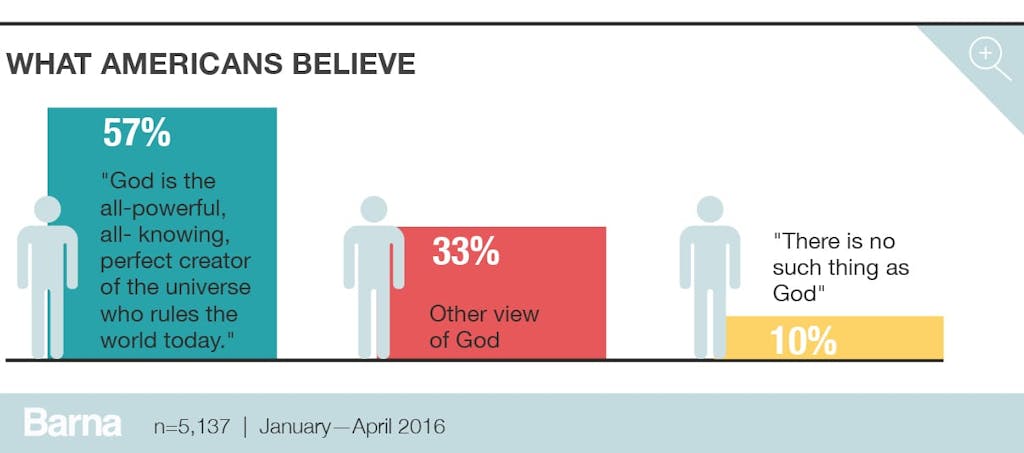
Comment on this research and follow our work:
Twitter: @davidkinnaman | @roxyleestone | @barnagroup
Facebook: Barna Group
About the Research
The study on which these findings are based was conducted via online and telephone surveys conducted in January 2016 and 2016. A total of 5,137 interviews were conducted among a random sample of U.S. adults, ages 18 years of age or older. The sample error is plus or minus one percentage point at 95-percent confidence level.
Born again: Have made a personal commitment to Jesus Christ that is still important in their life today and believe that, when they die, they will go to heaven because they have confessed their sins and accepted Jesus Christ as their savior.
Evangelical Christian: Meet the born again criteria plus seven other conditions. These conditions include saying their faith is very important in their life today; believing they have a personal responsibility to share their religious beliefs about Christ with non-Christians; believing that Satan exists; believing that Jesus Christ lived a sinless life on earth; asserting that the Bible is accurate in all that it teaches; believing that eternal salvation is possible only through grace, not works; and describing God as the all-knowing, all-powerful, perfect deity who created the universe and still rules it today. Being classified as an evangelical is not dependent upon church attendance or the denominational affiliation of the church attended. Respondents were not asked to describe themselves as “evangelical.”
Bible-minded: believe the Bible is accurate in all the principles it teaches and have read the Scriptures within the past week.
Churched: attended church in the past month
Unchurched: have not attended church in the past 6 months
Practicing Christian: Those who attend a religious service at least once a month, who say their faith is very important in their lives and self-identify as a Christian
Non-practicing Christian: Those who self-identify as a Christian but do not qualify as a practicing Christian
Post-Christian: To qualify as “post-Christian,” individuals had to meet 60% or more of the following factors (nine or more). “Highly post-Christian” individuals meet 80% or more of the factors (12 or more of these 15 criteria):
- Do not believe in God
- Identify as atheist or agnostic
- Disagree that faith is important in their lives
- Have not prayed to God (in the last year)
- Have never made a commitment to Jesus
- Disagree the Bible is accurate
- Have not donated money to a church (in the last year)
- Have not attended a Christian church (in the last year)
- Agree that Jesus committed sins
- Do not feel a responsibility to “share their faith”
- Have not read the Bible (in the last week)
- Have not volunteered at church (in the last week)
- Have not attended Sunday school (in the last week)
- Have not attended religious small group (in the last week)
- Do not participate in a house church ( in the last year)
About Barna Group
The Barna Group is a private, non-partisan, for-profit organization under the umbrella of the Issachar Companies. Located in Ventura, California, Barna Group has been conducting and analyzing primary research to understand cultural trends related to values, beliefs, attitudes and behaviors since 1984.
2020
In 2020, we will be celebrating 30 years in ministry. Twenty of them alone were spent in America where we have held some 3,000 services across 25+ different states. In these three decades, I have seen genuine revival with the Glory of God moving in only twice.
The first time was in 1990, right after the fall of the Berlin Wall in Bulgaria, when our youth group of a dozen students grew up to 300 during the spring semester alone. One of those nights, 26 young people literally walked through the door of the small hall we were renting, gave their lives to the Lord and were baptized with the Holy Spirit – all of them on the spot in that one service. I can still remember them all speaking in tongues and none of us knowing what just hit us. As the visible glory of God descended upon us, we were not able to shut down the service till well after midnight. We got written up for breaking curfew, but our names were written in Heaven.
The second time was at the turn of the century when in the summer of 1999 the Lord opened doors to preach over 20 revivals. I started seminary in the fall and travelled back to South Carolina literally every weekend that first semester just to finish all scheduled preaching appointments. Some of the readers of this letter well remember that one or more of those meetings were in your church. And I have been praying for the same move of God since then.
Though we have had similar trends in our ministry in 2014 and then at the start of 2017, it was only this year again that I am seeing the signs of a great revival taking place just like in 1989 and 1999. More and more ministers we contact share the same feel for another great revival and after much prayer, fasting and anticipation I have become convinced that God is on the move in 2019.
For these reasons, we are approaching this season of Revival Harvest Campaign in 2019-2020 with great anticipation. We urge you to pray along with us and seek the will of the Lord – what is it that He wants us to do in this season of upcoming Revival? A move of God of such magnitude and rarity should not be taken lightly!
Church on Mission: 30 Years of Ministry in 14 articles on World Missions
Church on Mission: As we get ready to celebrate 30 years in the ministry, 25 of which solely in Missions, we can truly say that 2019 has been one of the most challenging, but also most productive year in missions for us so far. For this reason, we have attempted to sum it all up in 14 articles on World Missions which are being published as a sequel on our Cup & Cross Ministries website in early 2020 as The Church on Mission. We have contributed in publishing further research in missions in the upcoming 2020 Encyclopedia of Global Pentecostalism.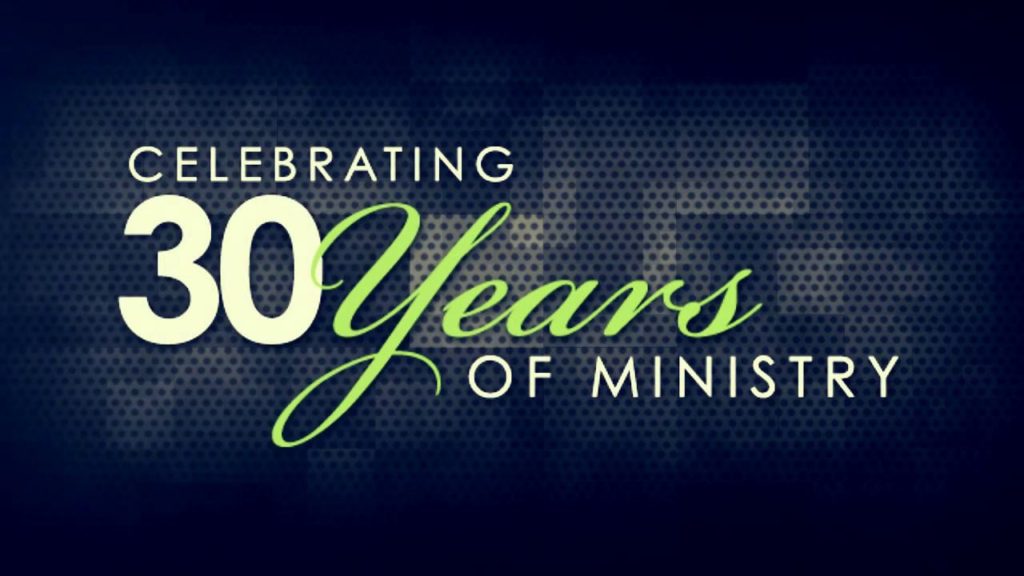
Merry Christmas from all of us
CHRISTMAS BOOK SALE
Since 2011, we have authored over two dozen books related to our ministry and mission work in Eastern Europe. As several of the prints are now almost exhausted and second/third editions and several new titles are under way, we are releasing all currently available editions in a Christmas sale through the month of December. All titles are available at up to 30% off and Amazon offers free shipping and extra savings for bundle purchases.
Social Services Act postponed by 6 months in BULGARIA
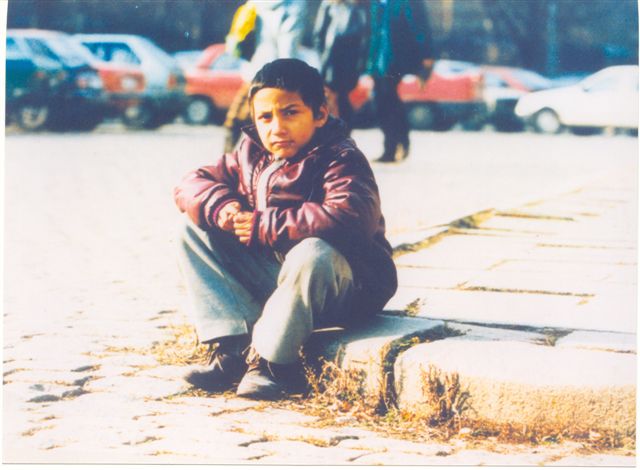 Sofia. The Parliament has postponed the entry into force of the Social Services Act by 6 months, Focus News Agency reported. The decision was supported by 149 votes in favor, four MPs voted against and four abstained.
Sofia. The Parliament has postponed the entry into force of the Social Services Act by 6 months, Focus News Agency reported. The decision was supported by 149 votes in favor, four MPs voted against and four abstained.
The Social Services Act was passed in March 2019 and was due to come into force on 1 January 2020. Due to protests against the project, the government reached a consensus to postpone it for 6 months. This was what the United Patriots Group proposed and it was accepted by the plenary.
The MPs rejected а proposal made by Volya party to postpone the law by one year, as well as the proposal made by Ataka party for it to be repealed. The MPs also did not accept the proposals by the MRF party for amendments to the Social Services Act.
Children’s Coloring Cookbook
 Kariyana’s Kitchen: Children’s Coloring Cookbook
Kariyana’s Kitchen: Children’s Coloring Cookbook
A coloring cookbook for children with recipes, blank cards, conversion charts and more!
- Paperback: 37 pages
- Publisher: Independently published (November 28, 2019)
- Language: English
- ISBN-10: 1704006821
- ISBN-13: 978-1704006826
- Product Dimensions: 6 x 0.1 x 9 inches


